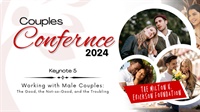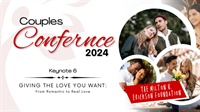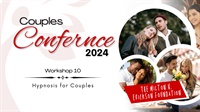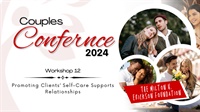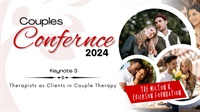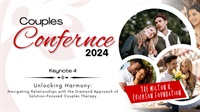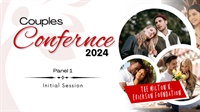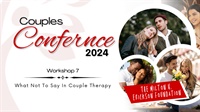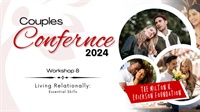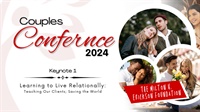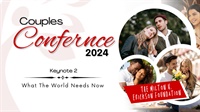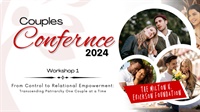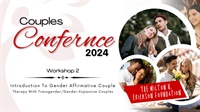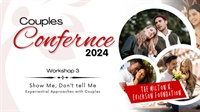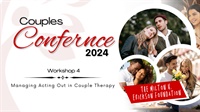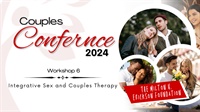- Average Rating:
- Not yet rated
- Topic Areas:
- Keynotes
- Bundle(s):
- 2024 Couples Conference Bundle
- Categories:
- Couples Conference | Couples Conference 2024
- Faculty:
- Rick Miller, MSW
- Course Levels:
- Master Degree or Higher in Health-Related Field
- Duration:
- 59:24
- Format:
- Audio and Video
- Original Program Date:
- May 05, 2024
- Short Description:
- Gay men in our culture are mythologized, pathologized, envied, ignored, and oversimplified. Clinicians may be experts in treating heterosexual couples, but too often they miss out on the most effective interventions for this specific population. Men presenting for couples treatment are frequently seeking closer ties—while simultaneously embracing independence and avoidant behaviors. These norms are accepted within the gay community and are also considered norms of masculinity for cisgender men. The couples therapist faces the challenge of transcending these norms and suggesting an intimacy regime that is satisfactory for men. To be effective, it’s essential for clinicians to appreciate community nuances and to feel comfortable talking about gay sexuality. Cultural and racial backgrounds also need to be understood as part of the couples matrix.
- Price:
- $59.00 - Base Price
- Average Rating:
- Not yet rated
- Topic Areas:
- Keynotes
- Bundle(s):
- 2024 Couples Conference Bundle
- Categories:
- Couples Conference | Couples Conference 2024
- Course Levels:
- Master Degree or Higher in Health-Related Field
- Duration:
- 1:02:44
- Format:
- Audio and Video
- Original Program Date:
- May 05, 2024
- Short Description:
- The major difference between romantic and real love is that romantic love HAPPENS to you without your choice. It finds you. In contrast, real love is nowhere to be found and it does not exist without your choice. In fact, it comes into being only by an act of will. You create it, and, in that act, you become what you want. This lecture will describe the paradox of “giving what you want” is the only way to get it.
- Price:
- $59.00 - Base Price
- Average Rating:
- Not yet rated
- Topic Areas:
- Topical Panels | Transference Focused Psychotherapy (TFP) | Infidelity
- Bundle(s):
- 2024 Couples Conference Bundle
- Categories:
- Couples Conference | Couples Conference 2024 | Pioneers in Couples and Family Therapy
- Faculty:
- Stan Tatkin, PsyD, MFT | Ari Tuckman, PsyD
- Course Levels:
- Master Degree or Higher in Health-Related Field
- Duration:
- 56:43
- Format:
- Audio and Video
- Original Program Date:
- May 05, 2024
- Short Description:
- This panel explores the painful aftermath of betrayal and the challenge of proving trustworthiness after infidelity. Clinicians examine lingering doubt, repeated violations, and the difficulty of rebuilding trust when past promises were broken. Emphasizing transparency, mutual effort, and shared vision, the discussion offers both conceptual models and practical tools to support therapists working at the edges of relational repair.
- Price:
- $59.00 - Base Price
- Average Rating:
- Not yet rated
- Topic Areas:
- Workshops
- Bundle(s):
- 2024 Couples Conference Bundle
- Categories:
- Couples Conference | Couples Conference 2024
- Faculty:
- Lilian Borges, MA, LPC
- Course Levels:
- Master Degree or Higher in Health-Related Field
- Duration:
- 2:00:39
- Format:
- Audio and Video
- Original Program Date:
- May 05, 2024
- Short Description:
- Hypnosis is a powerful tool for change and when used in couples therapy it can connect couples with their internal resources, teach them co-regulation, and help create secure bonding. This workshop will teach simple and impactful techniques that you’ll be able to use right away with your couples to empower them to change and make therapy session memorable. No previous experience with hypnosis is necessary.
- Price:
- $59.00 - Base Price
- Average Rating:
- Not yet rated
- Topic Areas:
- Workshops
- Bundle(s):
- 2024 Couples Conference Bundle
- Categories:
- Couples Conference | Couples Conference 2024
- Course Levels:
- Master Degree or Higher in Health-Related Field
- Duration:
- 1:21:29
- Format:
- Audio and Video
- Original Program Date:
- May 05, 2024
- Short Description:
- Talking is the most dangerous thing most people do, and listening is the most infrequent. Participants in this workshop will learn that “how” we talk, not “what” we talk about is the source of all human conflict. And they will learn a new way of talking without criticism, listening without judgment, and connecting beyond difference that will be transformative in all aspects of their lives, including how they do couple’s therapy.
- Price:
- $59.00 - Base Price
- Average Rating:
- Not yet rated
- Topic Areas:
- Workshops
- Bundle(s):
- 2024 Couples Conference Bundle
- Categories:
- Couples Conference | Couples Conference 2024
- Faculty:
- Ari Tuckman, PsyD
- Course Levels:
- Master Degree or Higher in Health-Related Field
- Duration:
- 2:00:51
- Format:
- Audio and Video
- Original Program Date:
- May 05, 2024
- Short Description:
- Stressed out, burned out couples don’t have the time or energy to take care of themselves, let alone to nurture their relationship. They come to couples therapy, but then say they’re too busy when they don’t apply what is discussed in session. They’re cutting corners on sleep, diet, and exercise and thereby have less cognitive and emotional bandwidth, including for their partner. They’re more irritable with each other, less patient, and less tolerant of differences. They can easily fall into a zero-sum tug of war where both partners hope for more support from the other, but neither has it to give, furthering the discontent with each other. Everyone knows the obvious good advice on sleep, diet, and exercise, yet then doesn’t always do it. What does this poor self-care reveal about the individual or the relationship? What are the deeper individual and relationship dynamics that interfere with this self-care?
- Price:
- $59.00 - Base Price
- Average Rating:
- Not yet rated
- Topic Areas:
- Keynotes | Couples Therapy | Ethical Practice | Therapist Development
- Bundle(s):
- 2024 Couples Conference Bundle
- Categories:
- Couples Conference | Couples Conference 2024 | Pioneers in Couples and Family Therapy
- Faculty:
- William Doherty, PhD
- Course Levels:
- Master Degree or Higher in Health-Related Field
- Duration:
- 57:54
- Format:
- Audio and Video
- Original Program Date:
- May 04, 2024
- Short Description:
- Therapists experience the same relationship issues we see in our offices. Although our clinical training may give us more access to our inner emotional lives than many people, we face “occupational hazards,” such as a tendency to read our partner’s mind and then explain it to them. With humility and humor, let’s explore the relational self of the therapist and how we sometimes show up in couple therapy. In this workshop, we’ll learn how to how to help fellow therapists when they come as clients to leverage their personal and professional strengths to have healthier relationships—and avoid blind spots that come with the territory.
- Price:
- $59.00 - Base Price
- Average Rating:
- Not yet rated
- Topic Areas:
- Keynotes
- Bundle(s):
- 2024 Couples Conference Bundle
- Categories:
- Couples Conference | Couples Conference 2024
- Faculty:
- Elliott Connie, MA, LPC
- Course Levels:
- Master Degree or Higher in Health-Related Field
- Duration:
- 1:01:58
- Format:
- Audio and Video
- Original Program Date:
- May 04, 2024
- Short Description:
- In this keynote, we will delve into the transformative realm of Solution-Focused Couples Therapy, exploring the Diamond Approach that unlocks the potential for harmony in relationships. This approach focuses on cultivating positive change, resilience, and effective communication, empowering couples to navigate challenges and deepen their connection. Join us on a journey to discover practical tools and insights that foster understanding, promote emotional intimacy, and pave the way for enduring relationship satisfaction.
- Price:
- $59.00 - Base Price
- Average Rating:
- Not yet rated
- Topic Areas:
- Topical Panels | Clinical Process | Couples Therapy
- Bundle(s):
- 2024 Couples Conference Bundle
- Categories:
- Couples Conference | Couples Conference 2024 | Pioneers in Couples and Family Therapy
- Faculty:
- Terry Real, LICSW | Elliott Connie, MA, LPC | William Doherty, PhD
- Course Levels:
- Master Degree or Higher in Health-Related Field
- Duration:
- 59:19
- Format:
- Audio and Video
- Original Program Date:
- May 04, 2024
- Short Description:
- This workshop focuses on managing the first couples therapy session—often the most critical. It covers how to establish a working alliance with partners who may be ambivalent, reactive, or have conflicting goals. Key strategies include assertive leadership, empathic engagement, and structured techniques like discernment counseling. Topics include assessing prior therapy, clarifying desired outcomes, and identifying the couple’s relational patterns to set the stage for effective, goal-oriented work.
- Price:
- $59.00 - Base Price
- Average Rating:
- Not yet rated
- Topic Areas:
- Topical Panels
- Bundle(s):
- 2024 Couples Conference Bundle
- Categories:
- Couples Conference | Couples Conference 2024
- Faculty:
- Tammy Nelson, PhD | Lilian Borges, MA, LPC | Shawn Giammattei, PhD | Rick Miller, MSW
- Course Levels:
- Master Degree or Higher in Health-Related Field
- Duration:
- 1:00:10
- Format:
- Audio and Video
- Original Program Date:
- May 04, 2024
- Short Description:
- The needs of couples change as our times are changing. Flexibility around sexuality, gender and betrayal are skills that we need to continue to incorporate. This panel will discuss issues of gender, identity shifts, sex and intimacy, and multiculturalism that modern couples encounter in their relationships. We will also discuss alternative and modern monogamy structures and how to create new monogamy agreements.
- Price:
- $59.00 - Base Price
- Average Rating:
- Not yet rated
- Topic Areas:
- Workshops | Couples Therapy | Ethical Practice | Therapist Development
- Bundle(s):
- 2024 Couples Conference Bundle
- Categories:
- Couples Conference | Couples Conference 2024 | Pioneers in Couples and Family Therapy
- Faculty:
- William Doherty, PhD
- Course Levels:
- Master Degree or Higher in Health-Related Field
- Duration:
- 1:47:03
- Format:
- Audio and Video
- Original Program Date:
- May 04, 2024
- Short Description:
- Although nowadays we have great models of couple therapy, therapists can become pessimistic in working with difficult couples—and inadvertently send messages that undermine their relationships. Based on a new research study with clients who have been in couple therapy, this presentation will describe things to generally avoid saying to couples about their relationship and its prospects for repair. The workshop will offer a mindset for staying positive with couples and a set of skills for handling therapeutic impasses without resorting to making comments that undermine the therapy and the couple relationship.
- Price:
- $59.00 - Base Price
- Average Rating:
- Not yet rated
- Topic Areas:
- Workshops | Couples Therapy | Relational Life Therapy Model (RLT)
- Bundle(s):
- 2024 Couples Conference Bundle
- Categories:
- Couples Conference | Couples Conference 2024 | Pioneers in Couples and Family Therapy
- Faculty:
- Terry Real, LICSW
- Course Levels:
- Master Degree or Higher in Health-Related Field
- Duration:
- 2:00:54
- Format:
- Audio and Video
- Original Program Date:
- May 04, 2024
- Short Description:
- This workshop outlines the core phases of Relational Life Therapy (RLT): data gathering, confronting power imbalances, and teaching relational skills. It emphasizes the role of the adaptive child, relational mindfulness, and moving from complaint to request. Key topics include managing grandiosity and shame, fostering maturity, setting boundaries, practicing loving power, and cultivating relational joy. Strategies for addressing defensiveness, narcissism, and behavior change are also presented.
- Price:
- $59.00 - Base Price
- Average Rating:
- Not yet rated
- Topic Areas:
- Workshops
- Bundle(s):
- 2024 Couples Conference Bundle
- Categories:
- Couples Conference | Couples Conference 2024
- Faculty:
- Rick Miller, MSW
- Course Levels:
- Master Degree or Higher in Health-Related Field
- Duration:
- 2:00:27
- Format:
- Audio and Video
- Original Program Date:
- May 04, 2024
- Short Description:
- Male couples face multiple challenges. Living with a status that is unrecognized or marginalized, and where societal homophobia is consciously and unconsciously internalized, serves to erode these couples’ strengths and ability to thrive. This workshop will explore how male couples maintain successful long-term relationships while choosing the model (heteronormative, open, monogamous, polyamory, and betrayal) that is right for them. Additionally it will address how gay development impacts the wellbeing of male couples.
- Price:
- $59.00 - Base Price
- Average Rating:
- Not yet rated
- Topic Areas:
- Keynotes | Couples Therapy | Relational Life Therapy Model (RLT) | Social Issues
- Bundle(s):
- 2024 Couples Conference Bundle
- Categories:
- Couples Conference | Couples Conference 2024 | Pioneers in Couples and Family Therapy
- Faculty:
- Terry Real, LICSW
- Course Levels:
- Master Degree or Higher in Health-Related Field
- Duration:
- 1:02:49
- Format:
- Audio and Video
- Original Program Date:
- May 03, 2024
- Short Description:
- This talk examines the global rise of patriarchy and its impact on intimate relationships, highlighting how anti-relational culture contributes to high failure rates in long-term partnerships. The speaker presents Relational Life Therapy (RLT) as a solution, built on three phases: loving confrontation, trauma work, and skill-building. Emphasizing the need to teach relational skills in schools, the approach addresses both individual challenges—like grandiosity and shame—and broader systemic influences to build healthier, more connected relationships.
- Price:
- $59.00 - Base Price
- Average Rating:
- Not yet rated
- Topic Areas:
- Keynotes | Psychobiological Approach to Couples Therapy (PACT) | Transference Focused Psychotherapy (TFP) | Trauma Studies
- Bundle(s):
- 2024 Couples Conference Bundle
- Categories:
- Couples Conference | Couples Conference 2024 | Pioneers in Couples and Family Therapy
- Faculty:
- Stan Tatkin, PsyD, MFT
- Course Levels:
- Master Degree or Higher in Health-Related Field
- Duration:
- 1:05:04
- Format:
- Audio and Video
- Original Program Date:
- May 03, 2024
- Short Description:
- Exploring what sustains long-term romantic partnerships, this keynote reframes love as insufficient without shared vision, purpose, and principles of governance. Tatkin outlines how secure-functioning couples reduce threat, foster co-regulation, and build enduring bonds by operating as collaborative, fair, and organized systems grounded in mutual responsibility.
- Price:
- $59.00 - Base Price
- Average Rating:
- Not yet rated
- Topic Areas:
- Workshops | Couples Therapy | Relational Life Therapy Model (RLT)
- Bundle(s):
- 2024 Couples Conference Bundle
- Categories:
- Couples Conference | Couples Conference 2024 | Pioneers in Couples and Family Therapy
- Faculty:
- Terry Real, LICSW
- Course Levels:
- Master Degree or Higher in Health-Related Field
- Duration:
- 1:30:25
- Format:
- Audio and Video
- Original Program Date:
- May 03, 2024
- Short Description:
- This presentation introduces Relational Life Therapy (RLT), a three-phase approach centered on awakening clients, confronting truth with compassion, and engaging in deep trauma work. It addresses power imbalances in couples by identifying “blatant” and “latent” roles, and emphasizes forming therapeutic alliances with clients’ wise adult selves. Key themes include relational mindfulness, empathy, managing grandiosity, and promoting systemic change for lasting relational transformation.
- Price:
- $59.00 - Base Price
- Average Rating:
- Not yet rated
- Topic Areas:
- Workshops
- Bundle(s):
- 2024 Couples Conference Bundle
- Categories:
- Couples Conference | Couples Conference 2024
- Faculty:
- Shawn Giammattei, PhD
- Course Levels:
- Master Degree or Higher in Health-Related Field
- Duration:
- 2:01:32
- Format:
- Audio and Video
- Original Program Date:
- May 03, 2024
- Short Description:
- Dr. Giammattei will present the underlying framework that therapists who work with transgender or gender-expansive (TGE) couples need to understand to provide gender-affirming treatment. He will share ways to explore your own hetero/cis-normative beliefs around coupling and how these influence the models you choose, the questions you ask, and the interventions you use. While TGE couples experience many of the same issues as other couples, we will explore the minority stress and unique stressors that impact these issues in profound ways. Dr. Giammattei will use experiential exercises and clinical vignettes to discover and utilize the basics of the gender-affirming approach to couple therapy. Regardless of the model of couple therapy used, being a gender-affirming couples therapist requires both an understanding of your own gender narratives, the hetero/cisnormativity in your models, as well as the key issues that may impact couples where one or more partners is TGE.
- Price:
- $59.00 - Base Price
- Average Rating:
- Not yet rated
- Topic Areas:
- Workshops
- Bundle(s):
- 2024 Couples Conference Bundle
- Categories:
- Couples Conference | Couples Conference 2024
- Faculty:
- Lilian Borges, MA, LPC
- Course Levels:
- Master Degree or Higher in Health-Related Field
- Duration:
- 1:48:16
- Format:
- Audio and Video
- Original Program Date:
- May 03, 2024
- Short Description:
- Experiential techniques can reach the heart of the matter sooner as it focus more on process and less on content but couples sometimes can resist engaging in it preferring to stay on the storytelling of the last argument. This workshop will present ways to circumvent the “blame game” using experiential techniques with a “twist” that will make sessions come to life, bringing more fun, and emotional impact to the sessions, and making it memorable.
- Price:
- $59.00 - Base Price
- Average Rating:
- Not yet rated
- Topic Areas:
- Workshops | Psychobiological Approach to Couples Therapy (PACT) | Couples Therapy
- Bundle(s):
- 2024 Couples Conference Bundle
- Categories:
- Couples Conference | Couples Conference 2024 | Pioneers in Couples and Family Therapy
- Faculty:
- Stan Tatkin, PsyD, MFT
- Course Levels:
- Master Degree or Higher in Health-Related Field
- Duration:
- 2:08:22
- Format:
- Audio and Video
- Original Program Date:
- May 03, 2024
- Short Description:
- This workshop examines acting out as a breakdown in therapeutic alliance. Tatkin emphasizes confronting the couple system—not individual partners—to restore collaboration and keep therapy on track. Using techniques like supportive confrontation and the crossing method, therapists learn to address blame, misdirection, and dysregulation with less effort and greater strategic impact.
- Price:
- $59.00 - Base Price
- Average Rating:
- Not yet rated
- Topic Areas:
- Workshops
- Bundle(s):
- 2024 Couples Conference Bundle
- Categories:
- Couples Conference | Couples Conference 2024
- Faculty:
- Elliott Connie, MA, LPC
- Course Levels:
- Master Degree or Higher in Health-Related Field
- Duration:
- 1:57:47
- Format:
- Audio and Video
- Original Program Date:
- May 03, 2024
- Short Description:
- This presentation will provide an overview of Solution Building Couples Therapy (SBCT). The presenter will introduce the Diamond Approach to SBCT and will provide detailed explanations of each step of the Diamond Approach. Participants will see real examples of actual couples engaged in SBCT. Participants will engage in in-depth discussions about how to conceptualize cases from this perspective.
- Price:
- $59.00 - Base Price
- Average Rating:
- Not yet rated
- Topic Areas:
- Workshops
- Bundle(s):
- 2024 Couples Conference Bundle
- Categories:
- Couples Conference | Couples Conference 2024
- Faculty:
- Tammy Nelson, PhD
- Course Levels:
- Master Degree or Higher in Health-Related Field
- Duration:
- 1:55:37
- Format:
- Audio and Video
- Original Program Date:
- May 03, 2024
- Short Description:
- Therapists and counselors need training and tools to intervene with relationship issues where there are sexual dilemmas. After an overview of clinical concepts, this course will offer skills to help therapists and counselors address concerns around intimacy, helping individuals and couples to improve their intimate relationships. These topics may trigger countertransference and projection for the therapist and couples can face frustration and repeat patterns that lead to destructive behaviors both individually and with a partner. We will the basics of the integrative sex therapy model and touch upon trauma, desire issues and recovery from affairs and how these unique issues impact treatment. Based on clinical practice, research and case examples, we will cover interventions and techniques that foster effective, ethical therapeutic relationships for clients struggling with intimacy issues.
- Price:
- $59.00 - Base Price


